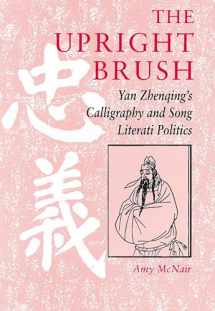
The Upright Brush: Yan Zhenqing's Calligraphy and Song Literati Politics
Book details
Summary
Description
In the history of Chinese calligraphy, few are more famous than the eighth-century statesman Yan Zhenqing (709-785). His style is still taught today as a standard, and Chinese bookstores the world over stock inexpensive reproductions of his works for sale as copybooks.
Yet Yan's style cannot be called conventionally attractive. "Correct," "severe," "serious," "forceful" are terms habitually applied to describe his writing--rarely has his calligraphy been called graceful or beautiful. How, then, did Yan earn such an eminent place in the history of art?
In The Upright Brush, Amy McNair argues for the political rather than purely aesthetic basis for Yan Zhenqing's artistic reputation. She shows how his prominent position was made for him in the eleventh century by a handful of influential men who sought to advance their own position by associating themselves with Yan's reputation for uprightness. Equating style with personality, they adopted Yan's calligraphic style as a way to clothe themselves in his persona.
Sophisticated, informed, and intelligent, The Upright Brush illuminates an episode (one of many) in the history of Chinese culture where the creative reinterpretation of the past was used for contemporary political means. It will be eagerly welcomed by all scholars of Chinese culture and history, as well as by those interested in the making and reading of art.


We would LOVE it if you could help us and other readers by reviewing the book
Book review



